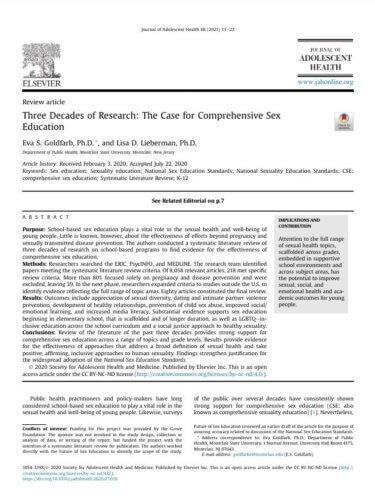Child and Youth Development
Three Decades of Research: The Case for Comprehensive Sex Education
Open Access: Yes
Abstract
Purpose: School-based sex education plays a vital role in the sexual health and well-being of young people. Little is known, however, about the effectiveness of efforts beyond pregnancy and
sexually transmitted disease prevention. The authors conducted a systematic literature review of three decades of research on school-based programs to find evidence for the effectiveness of
comprehensive sex education.
Methods: Researchers searched the ERIC, PsycINFO, and MEDLINE. The research team identified papers meeting the systematic literature review criteria. Of 8,058 relevant articles, 218 met specific review criteria. More than 80% focused solely on pregnancy and disease prevention and were excluded, leaving 39. In the next phase, researchers expanded criteria to studies outside the U.S. to identify evidence reflecting the full range of topic areas. Eighty articles constituted the final review.
Results: Outcomes include appreciation of sexual diversity, dating and intimate partner violence prevention, development of healthy relationships, prevention of child sex abuse, improved social/emotional learning, and increased media literacy. Substantial evidence supports sex education beginning in elementary school, that is scaffolded and of longer duration, as well as LGBTQ-inclusive education across the school curriculum and a social justice approach to healthy sexuality.
Conclusions: Review of the literature of the past three decades provides strong support for comprehensive sex education across a range of topics and grade levels. Results provide evidence for the effectiveness of approaches that address a broad definition of sexual health and take positive, affirming, inclusive approaches to human sexuality. Findings strengthen justification for the widespread adoption of the National Sex Education Standards.
Relevance
Effective, inclusive, and rights-based classroom approaches (preschool through grade 12) that teach “appreciation of sexual diversity” lowered homophobia, reduced homophobic bullying, expanded understanding of gender and gender norms, and “increased knowledge, awareness and appreciation of gender equity and sexual rights, and awareness of discrimination and oppression based on gender and sexual orientation.”
“Strong evaluations demonstrate a range of positive outcomes for programs that focus on prevention of dating violence (DV) and intimate partner violence (IPV) among both middle school and high school youth.” These programs resulted in “reduction in rape myths, victim blaming, and sexist attitudes…improved communication skills…reduced acceptance of sexual coercion…increased self-efficacy” and a decreased in DV and IPV perpetuation and victimization. They also resulted in increased bystander interventions.
Effective programs, too, resulted in increased relationship and dating skills. Among younger children, they also reduced child abuse by resulting in “improved knowledge, attitudes, skills and social-emotional outcomes related to personal safety and touch” and “improved disclosure skills and behaviors.”
Comprehensive, age-appropriate sex education also “demonstrate a range of important social-emotional outcomes” and “demonstrated increased media deconstruction skills, understanding of how media affects both sense of self and perceptions of teen norms, and, most notably, intentions for communication with parents, partners, and medical providers about sex.”
Additionally, “This review offers substantial evidence that sexuality education is most effective when begun early and before sexual activity begins.”
Citation
Goldfarb, E. A., & Lieberman, L. D. (2021). Three Decades of Research: The Case for Comprehensive Sex Education. Journal of Adolescent Health, 68(1), 13-27. https://doi.org/10.1177/089124302236992

